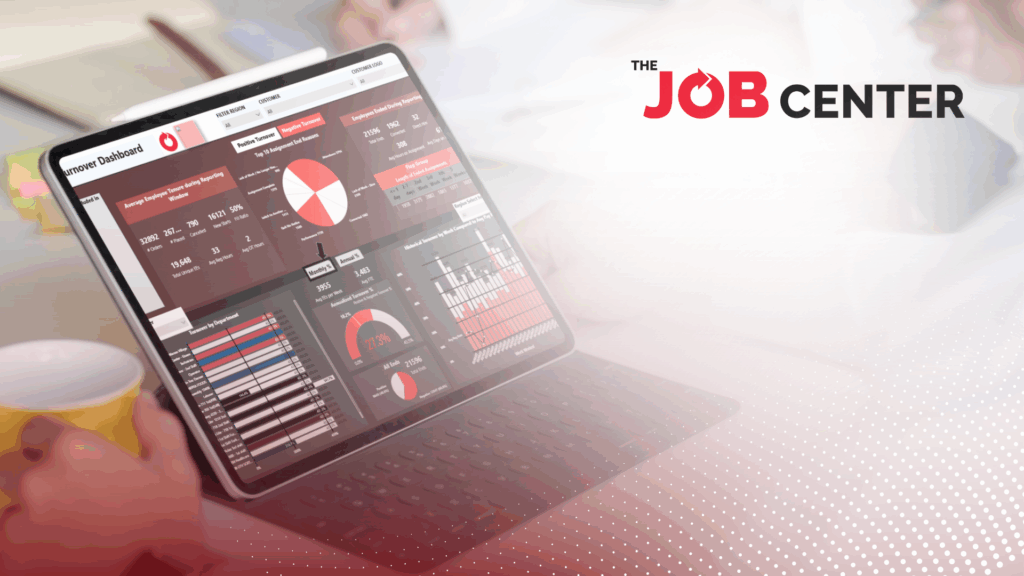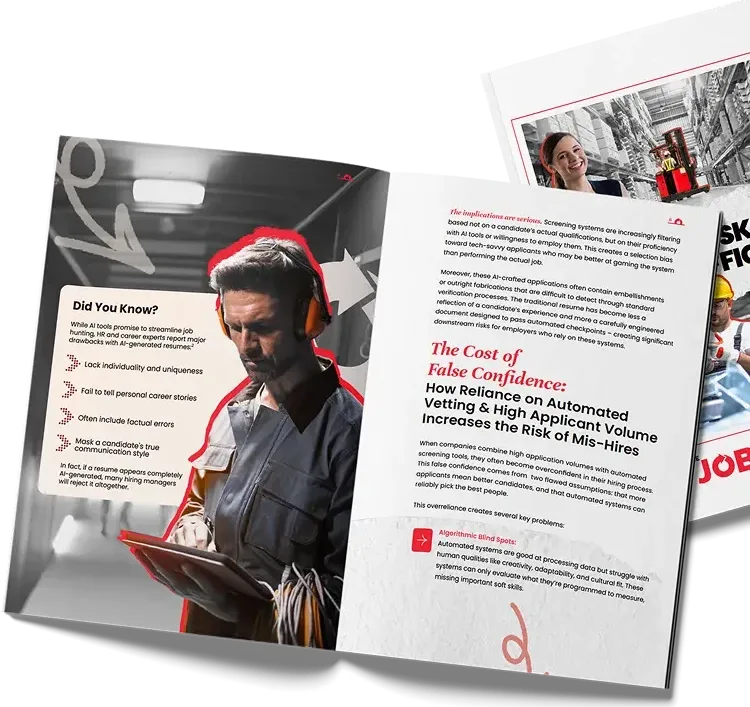The Hidden Costs of a Bad Hire: How Staffing Agencies Save You Time, Money, and Stress

A recent study conducted by SHRM found that 77 percent of 2,366 HR professionals reported difficulty in filling their open full-time positions.¹ One factor that possibly drives this trend is the need for candidates who fit well with both the role and the organization as a whole.
The costs of a bad hire are more than meets the eye. In this article, we’ll discuss why it’s essential to avoid bad hires and how staffing experts can help.
What are the true costs of a bad hire?
The true costs of a bad hire extend far beyond the initial financial investment. Hiring mistakes can lead to higher costs in the long run. For example, a survey by CareerBuilder found that 75 percent of employers have made hiring mistakes that cost them an average of nearly 17,000 dollars per bad hire.²
When businesses make the wrong hiring decision, they face different direct and indirect expenses. This can include recruitment costs, time invested in interviewing, potential severance packages, and even decreased team morale. These lead to further expenses shouldered by the company. Some specific examples of hidden costs of bad hires are:
1. Loss of Productivity
A bad hire significantly reduces workplace productivity across multiple levels. When an employee can’t perform their job effectively, their own work suffers while also creating additional burdens for colleagues who must pick up the slack. The team often experiences disruption as workflows are interrupted, deadlines are missed, and continuity is broken.
This productivity drain extends beyond the immediate team. Other departments may need to compensate for shortfalls or go beyond the expected deadlines. This creates a domino effect throughout the organization that can persist long after the bad hire has left.
2. Increased Turnover Costs
When companies make poor hiring decisions, they typically face higher turnover rates. Regardless of whether bad hires leave on their own or are removed from their positions, their turnover rate tends to be quicker compared to suitable hires. This requires the company to restart the recruitment process, which can become expensive.
More concerning is how one problematic employee can drive good employees away. Team members working alongside underperforming or toxic colleagues can become frustrated, overworked, or demoralized. This can lead to their departure from the company, thus starting a costly cycle of additional recruiting, interviewing, and training expenses.
3. Loss of Institutional Knowledge
Furthermore, the loss of institutional knowledge during this turnover cascade creates severe operational vulnerabilities. When experienced employees depart, they take with them critical insights about systems, processes, client relationships, and informal workflows that often aren’t documented. This erosion of organizational memory can paralyze projects, disrupt client relationships, and force expensive reinvention of established procedures—making the total impact much greater than just the hiring expenses.
4. Wasted Onboarding Investments
Companies invest substantial resources in bringing new employees up to speed through formal training programs. Some even offer one-on-one mentoring or gradual integration into projects. When a hire doesn’t work out, these investments yield no return and must be repeated for their replacement.
The time spent by HR professionals, department managers, and team members in training and supporting the bad hire represents hours that could have been dedicated to productive work. Additionally, companies often invest in equipment, software licenses, uniforms, and other materials specific to each new employee. These tangible expenses, combined with the time spent to integrate someone into the company culture, can create significant sunk costs that cannot be recovered.
Staffing Agencies: Your Solution to Saving Time, Money, and Stress
Although the impact of a bad hire is unchangeable, it can be avoided using the right hiring practices. To ensure your talent acquisition process will yield the best results, you may consider partnering with experts in the field of staffing.
The right staffing agency can be a valuable solution for organizations looking to fill open positions. It can save you time and money and lower stress by contributing the following:
1. Established Talent Pools
Staffing agencies maintain extensive databases of pre-qualified candidates who are interested in new opportunities. So, partnering with a firm gives you immediate access to talent that would otherwise take weeks to find through traditional job postings.
These talent pools contain candidates with verified skills and experience levels. You will no longer need to consume valuable time and energy to build a candidate pipeline from scratch. When you work with a staffing firm, you tap into relationships they’ve developed over the years with both active and passive job seekers in your industry.
This ready access to qualified candidates means you can quickly review pre-vetted options rather than sorting through hundreds of unqualified applications. This can significantly reduce the likelihood of making a bad hire due to ineffective background checks.
2. Faster Time-to-Fill
When your company faces an urgent hiring need, staffing agencies can accelerate your hiring timeline by leveraging their existing networks and recruiting infrastructure.
While internal hiring processes often take weeks, staffing firms can usually present qualified candidates within days—sometimes even hours—for common positions. This speed stems from their focused recruiting expertise and aforementioned talent pipelines. They are also equipped with streamlined evaluation and recruitment processes they’ve tried and tested.
If you partner with a staffing firm, you can minimize productivity gaps that happen when positions remain unfilled. You can also reduce overtime costs for existing staff since recruitment firms can provide you with the people you need. Quickly filling critical roles helps avoid the common mistake of rushed hiring decisions, which often result in bad hires.
3. Expertise in Industry and Role Matching
Staffing specialists bring deep knowledge of your industry’s talent landscape, current salary expectations, and required skill sets for specific roles. This expertise helps you define realistic job descriptions and compensation packages that attract the right caliber of candidates.
Your chosen staffing partner understands the nuanced differences between similar-sounding roles and can identify which candidates truly have the right experience for your specific needs. They’re also equipped to evaluate both technical qualifications and soft skills that determine a candidate’s success in your particular work environment.
By leveraging this specialized knowledge, you avoid the mistake of hiring someone who looks good on paper but lacks the precise combination of skills and attributes needed for success in your open positions.
4. Reduced Hiring Risks
Staffing agencies offer flexible hiring arrangements that significantly lower your risk exposure when bringing on new talent. For example, temp-to-hire options allow you to evaluate a candidate’s actual on-the-job performance before making a permanent hiring commitment.
Working with a staffing firm means you’re free of many HR responsibilities. Your chosen partner typically remains as the employer of record. They handle payroll, benefits, and compliance requirements. Their expertise reduces the hiring risks your company takes when acquiring new hires.
Many agencies also offer replacement guarantees if a direct placement doesn’t work out within a specified timeframe. These risk-mitigation strategies provide a safety net that isn’t available with traditional direct hiring. This gives you the opportunity to confirm a good fit before making a long-term investment in a new employee.
5. Retention-Driven Placements
Staffing firms succeed only when their placements stay and thrive in your organization. This is a powerful incentive for them to focus on long-term fit rather than quick fills. They take time to understand your company culture, team dynamics, growth opportunities, and management style to identify the best candidates to join your teams.
The right staffing partner can objectively assess the compatibility between candidates and your organization in ways that internal hiring managers might miss. This emphasis on matching work styles, values, and career goals with your existing environment can lead to higher retention rates.
By focusing on these retention factors from the beginning of the hiring process, staffing agencies help you avoid the costly cycle of turnover that often follows a bad hire.
Read more: How to Retain Top Performers in High-Turnover Roles Without Breaking the Budget
Choose a staffing partner who can produce results.
Partner with The Job Center! We are a recruitment firm that builds success on long-term partnerships benefiting both our clients and our professionals. More than simple background checks, we offer effective placements that can help your business succeed.
Want to learn more about our services? Contact us today!
References
- “75% Of Employers Have Hired the Wrong Person, Here’s How to Prevent That.” CareerBuilder, 2024, resources.careerbuilder.com/news-research/prevent-hiring-the-wrong-person.
- Maurer, Roy. “Talent Scarcity, Skills Gaps Challenge Recruiting.” SHRM, 12 Apr. 2024, www.shrm.org/topics-tools/news/talent-acquisition/talent-scarcity-skills-gaps-challenge-recruiting.

About
Joey Stoller
Other articles





